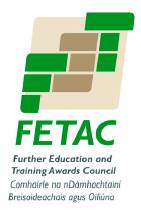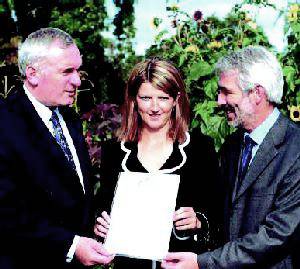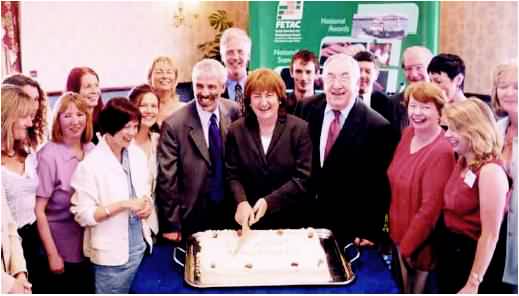| 2002 |

|
YEAR BOOK |
Further Education and Training Awards Council (FETAC)
|
Further Education and
Training Awards Council (FETAC
|


FETAC represents a new departure for learners engaged in further education and training, in that it unifies former certification agencies under one banner. The organisation carries out the functions of the former National Council for Vocational Awards (NCVA) and validates programmes for and makes awards on behalf of CERT/NCTB, F�S, Teagasc and BIM.
All FETAC awards will be part of a new inclusive national framework, which is being developed by the National Qualifications Authority of Ireland (NQAI). This framework will provide national recognition of achievement and access and progression opportunities for all learners in Ireland. The national framework of qualifications will have the capacity to facilitate international recognition of Irish awards through its linkages with counterpart frameworks in other countries.
Speaking recently to members of FETAC Council and staff, at a lunch to celebrate the organisation's first birthday, Professor Joyce O'Connor, Chair of FETAC, said 'FETAC's mission is to make quality assured awards in accordance with national standards within the national framework. In the 12 months since the establishment of FETAC, 63,000 FETAC awards have been presented to Irish learners. This is something to be proud of and should give us confidence for the future of FETAC and for the emerging Further Education and Training sector in Ireland'.

All programmes leading to FETAC awards will be quality assured and validated by FETAC. The programmes are delivered by a variety of Irish providers, including training centres, vocational colleges, community groups, Institutes of Technology, and private and public enterprise. For the first time in Ireland, the community and work-based learning sectors are also included and recognised as providers. Programmes include business, computing, science, technology, arts, crafts and apprenticeships. New programmes are continually being developed and existing ones modified in response to the changing needs of industry and society. Specialised science based programmes, for example, are on offer in the areas of Laboratory Techniques, Animal Care, Agriculture, Food and Horticulture.
Valerie Beck from Dublin is one FETAC graduate whose studies in Horticulture have led to a rewarding career in this area. She was also the very first person to receive a FETAC award. Valerie's interest in Horticulture prompted her to do a 12-month F�S course in Horticulture at Teagasc Research Centre in Kinsealy, leading to a Certificate in Amenity Horticulture. She then transferred to the National Botanical Gardens, Glasnevin, where she continued to study Horticulture for a further three years, before graduating last September with a FETAC Diploma in Horticulture. Valerie says 'Since receiving my award I have worked for Fingal County Council as a gardener in Malahide Castle and have now progressed to my current position as a Horticultural Instructor with F�S, teaching Horticultural Skills to eight students�.which I find very rewarding'.
FETAC will also ensure that procedures for access, transfer and progression are implemented locally and nationally, thus facilitating learners at all stages of life to continue education and training. Through the Higher Education Links Scheme, for example, learners who have attained a FETAC (NCVA Level 2) award may be eligible to apply for a course at a range of higher education institutions. Approximately 2,500 places annually are available on over 250 National Certificate and Diploma courses in the Institutes of Technology. The 17 Institutes participating in the Scheme offer a variety of general and specialist science based courses in areas such as Aquaculture, Chemical and Pharmaceutical Science, Physics and Instrumentation, Applied Microbiology, Molecular Biology, and Environmental Science.
Most programmes are modular based, allowing greater possibilities for the learner to progress at a pace suited to him or her. For this reason, many centres offer the choice of part-time or full-time courses. This trend reflects the changing face of education and training policy in Ireland, where the learner is now the central driver. Increasing flexibility and ease of access to further and higher education and training in Ireland are to be essential features of the Authority's learner-friendly national framework.
For further information on FETAC please email: [email protected] , or visit the website at: www.fetac.ie